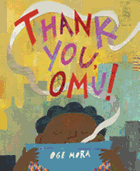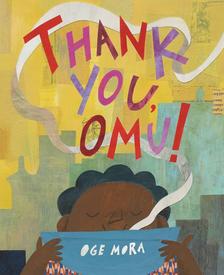
 From an open window of a top-floor apartment on "the corner of First Street and Long Street" comes a most delicious smell. Omu (pronounced AH-moo) is preparing "a thick red stew in a big fat pot for a nice evening meal." Certain that "[t]onight's dinner will surely be the best [she's] ever had," Omu reads her book as her supper simmers. The irresistible scent, however, can't be contained: it "waft[s] out the window and out the door, down the hall, toward the street, and around the block."
From an open window of a top-floor apartment on "the corner of First Street and Long Street" comes a most delicious smell. Omu (pronounced AH-moo) is preparing "a thick red stew in a big fat pot for a nice evening meal." Certain that "[t]onight's dinner will surely be the best [she's] ever had," Omu reads her book as her supper simmers. The irresistible scent, however, can't be contained: it "waft[s] out the window and out the door, down the hall, toward the street, and around the block."Soon enough, a loud "KNOCK!" interrupts Omu's reading. She opens her door to find a little boy who was distracted from playing with his race car by the "most delicious smell." Since she's made "quite a bit," Omu readily shares a bowl with the hungry boy, who eats and leaves with a satiated "THANK YOU, OMU!" The tempting aroma continues wafting "around the block" and no sooner has Omu settled back down when a double "KNOCK!" has her up again. This time Omu finds a police officer hoping for a taste. Again, Omu shares, sending the officer off with a satisfied "THANK YOU, OMU!" Another "KNOCK! KNOCK! KNOCK!" announces the arrival of Mr. Hot Dog Vendor, summoned by the "delectable" scent. Once more, Omu shares. "Throughout the day, people from all across the neighborhood [knock] on Omu's door" and, of course, no one leaves hungry.
As "the sky darkened, the streetlights brightened" and Omu got ready to enjoy her "big fat pot of thick red stew for her nice evening meal," she discovered her pot was utterly empty. Her "[s]orry and blue" disappointment doesn't last long however, because with a boisterous "KNOCK! KNOCK! KNOCK! KNOCK! KNOCK!," an exuberant crowd appears on her doorstep: "We are not here to ask... WE ARE HERE TO GIVE." Let the feasting begin!
Oge Mora makes her author/illustrator debut with a joyous homage to her personal Omu: her grandmother. Omu, Mora explains in her author's note, means "queen" in Igbo, the Nigerian language of her parents. "Yet for [Mora], growing up, it meant 'Grandma.' " Mora's late Omu was a neighborhood beacon, whose large pots of stew fed many: "Everyone in the community had a seat at my grandmother's table." Mora visually immortalizes her grandmother's ability to build community by enhancing her cut-paper designs with literal representations of assembling (recipes and clothing patterns), constructing (partial articles about city planning, parks, buildings) and connecting (maps). Mora's art casually yet vividly reminds readers of the diversity we encounter all around us, presenting her characters in all hues while acknowledging multiple languages in various cut-outs throughout. Words and pictures, food and people all come together to fill hearts with "happiness and love"--and to make sure that Omu, who gave the most, gets "the best she had ever had." --Terry Hong, Smithsonian BookDragon
Shelf Talker: The tantalizing scent of Omu's stew brings hungry strangers to her door until her intended dinner disappears, but then an impromptu neighborhood feast appears.

